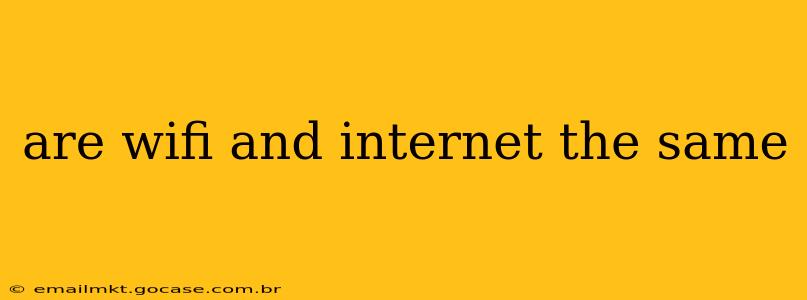Many people use the terms "WiFi" and "internet" interchangeably, but they are not the same thing. While closely related, they represent distinct aspects of how we connect to and use the online world. This article will clarify the difference, answering common questions and providing a comprehensive understanding of both concepts.
What is the Internet?
The internet is a global network of interconnected computer networks. Think of it as a vast, sprawling highway system connecting billions of devices worldwide. This network allows the sharing of information, resources, and communication across geographical boundaries. Websites, emails, online games, and streaming services all exist on the internet. The internet itself is a collection of data and the infrastructure allowing access to that data; it's the destination.
What is WiFi?
WiFi (Wireless Fidelity) is a wireless networking technology that allows devices like smartphones, laptops, and tablets to connect to the internet without using physical cables. It's essentially a local area network (LAN) that uses radio waves to transmit data. Your home router, for example, uses WiFi to broadcast an internet connection to your devices within range. WiFi is the method of accessing the internet; it's the transportation.
How Do WiFi and the Internet Work Together?
WiFi acts as a bridge between your devices and the internet. Your internet service provider (ISP) provides you with an internet connection, which your router then broadcasts using WiFi. Your devices connect to your router's WiFi network, granting them access to the internet. Without an internet connection from your ISP, your WiFi network would be useless; you'd only be able to connect to other devices on the same local network.
Can you have WiFi without the internet?
Yes, absolutely. If your router is set up but not connected to your ISP's modem, you can still create a WiFi network. However, this network will only allow devices connected to it to communicate with each other; you won't be able to access websites, email, or any other internet-based services. This is often useful for creating a private network for file sharing between devices within a home or small office.
Can you have internet without WiFi?
Yes, you can connect to the internet without WiFi using an ethernet cable directly connected to your modem or router. This is often preferred for tasks requiring a stable, high-speed connection, such as online gaming or video editing, as wired connections generally offer better performance than wireless ones. Other connection methods like cellular data (using your phone's mobile network) also allow internet access without WiFi.
What is the difference between a router and a modem?
A modem connects your home network to your ISP's network, providing the internet connection. A router receives this internet connection from the modem and creates a local area network (LAN), often broadcasting a WiFi signal to allow multiple devices to connect simultaneously. Essentially, the modem gets you online, and the router distributes that access within your home.
In summary, the internet is the vast network of networks, while WiFi is a specific technology for connecting devices wirelessly to that network. They work together, but are fundamentally different concepts. Understanding this distinction is crucial for navigating the digital world effectively.
